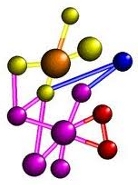Theme 3: Coordination & Logistics
Theme focus
Goods, people, and materials are handled using a vast range of equipment and transport vehicles, when transporting these from origins to destinations in large transport and distribution networks, production facilities, warehouses, and supply chains. The actions of the individual components directly affect the performance of the overall process-- the components form a truly networked multi-machine system. Without adequate coordination the performance of this process can quickly deteriorates in the presence of disturbances, resulting in huge losses.
This theme focuses on networked multi-machine systems in which coordination among multiple transport or production components is essential. This theme proposes innovative designs, control architectures, and logistical concepts for such systems. The role of interconnectivity and coordination are key concepts that are hereby investigated. The goal is hereby to achieve optimal performance with respect to costs, safety, resource-efficiency, and environmental impact, while taking into account the networked nature of the transport system.
Theme research questions
The key research questions of this theme are:
- How to design the strategies for logistics and process chain integration?
- How to design and standardize the optimal multi-machine system interactions?
- How select and dimension machines for a multi-machine system?
Research tools & Techniques
Fundamental approaches for design are developed on the one hand, while adopting these fundamental approaches in close cooperation with societal and industrial stake holders to more applied approaches. Successful projects have resulted in, amongst others, new transport concepts for container and dry bulk terminal operators, port and airport authorities, warehouse and manufacturing plant owners, and water, rail, road and intermodal transport companies.Here dynamic fleet management, real-time coordination and the role of communication technology form important considerations for designing efficient interactions.
Core techniques that are being developed and applied within this theme come from the fields of mathematical decision making / operations research, systems and control, (stochastics) optimization, scheduling, model predictive control, data analytics and statistics, multi-agent systems, discrete-event simulation, systems engineering, and graph theory.
Projects
- AVATAR
- The Implementation of Ship HYbridization (ISHY)
- Dynamic fleet managment for autonomous mobility-on-demand system
- Predictive Synchromodality for more Efficient Container Transportation
- Ship Model Identification and Autonomous Collision Avoidance
- Trend analysis of company performance: with environmental concerns for motor vehicle manufacturers
- Dynamic fleet management for autonomous vehicles
- Surface crack growth in rigid pipe reinforced with FRP
- Study of fleet energy efficiency optimization method based on big data
- Controlled Cool Logistics: Real-time coordination for fresher food
- Trajectory Tracking Control of Underactuated Surface Vessels
- Waterborne AGVs for Inter Terminal Transport
- Multi-level and multi-agent control of intermodal container transport systems
- Innovative concepts for Inter Terminal Transport on Maasvlakte 1 and 2 at the Port of Rotterdam
- Synchromodal container transport
- Distributed intelligence in AGV transport system control
- Optimizing airport airside logistic operations
- Operations performance assessment methodologies for seamless transport chains
- Optimization in Railway Traffic Control and Public Transport Systems
- Scheduling of discrete event transport systems
- Intelligent control for optimizing the operation of automated container terminal
- “Intelligent waterways” for optimal transport over water
- Intelligent multi-agent control for flexible coordination of transport hubs
- Intelligent maintenance in railways
- Equity and competition in railway traffic control disruption management
- DUBROVNIK -- Towards improved hinterland accessibility for the Port of Rotterdam
- Optimal Routes and optimal location of the airports for Low-Cost Airline Companies
- Integration and operational use of prognostics in the control of logistic systems
- TRANSUMO (Transition towards Sustainable Mobility)
- City box for sustainable city logistics

